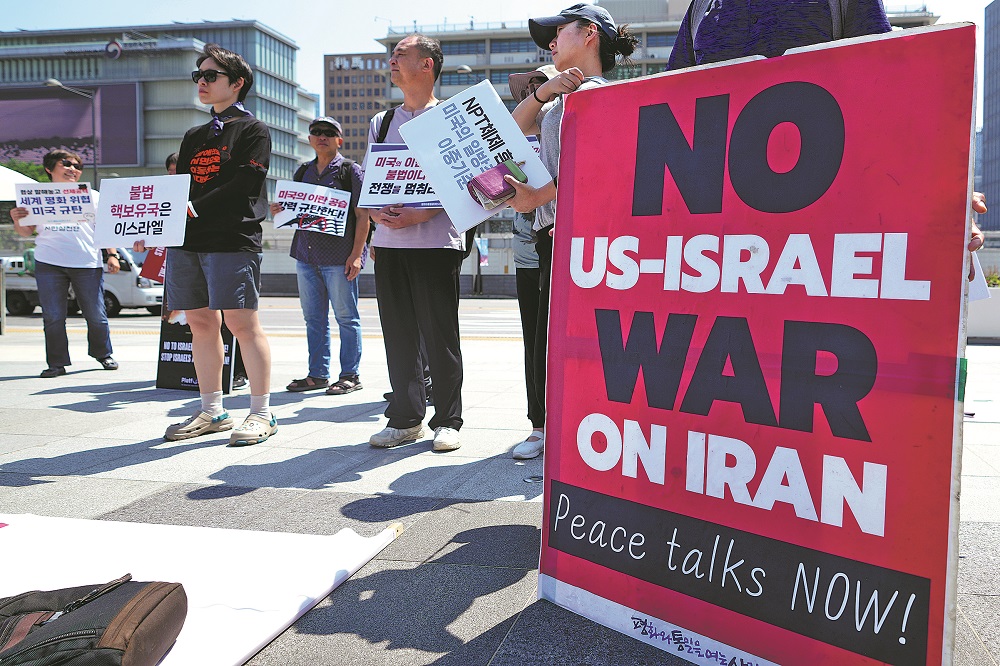Hormuz in crosshairs amid soaring tensions
Possible closure of key waterway stirs fears of oil shock, shipping disruption


Editor's note: As tensions in the Middle East flare to dangerous new heights, this page explores the global ripple effects of the United States' unprecedented strikes on Iran's nuclear sites. From Teheran's threat to close the Strait of Hormuz to mounting fears of an oil shock that could rattle Asia's growth outlook, the reports trace how a single flashpoint could reshape global markets and geopolitics.
The Strait of Hormuz, one of the world's most critical oil-shipping chokepoints, is again at the center of rising tensions after Iran's parliament voted on Sunday to authorize its potential closure following US airstrikes on Iranian nuclear sites.
The vote, symbolic yet politically charged, empowers Iran's Supreme National Security Council to enact the measure, state media reported. While it does not trigger immediate action, analysts say it underscores Teheran's intent to retaliate against the "blatant act of aggression" by the United States.
Iranian officials insisted the vote does not constitute an immediate closure of the strait but authorizes such action as part of a broader defensive posture.
"Iran has numerous options to respond to its enemies," Behnam Saeedi, a member of the parliament's National Security Committee presidium, told the Mehr news agency on Thursday. "Closing the Strait of Hormuz is one of the potential options."
The strait is the primary export route for Gulf oil producers such as Saudi Arabia. About 20 percent of the world's daily oil consumption — about 18 million barrels — passes through the narrow waterway.
Businesses in Gulf states are closely monitoring any developments, particularly whether the route will remain open, Gulf News reported.
"Yet, there are indications that the strait could be closed, which would disrupt global oil and container trade," said Sajith Marakar, managing director of Consolidated Services Bureau, a marine survey firm in the United Arab Emirates.
"If declared a war zone, cargo insurers for shipping vessels may refuse to cover the risk, halting vessel operations.
"A closure could delay supplies to Bahrain, Kuwait and Qatar. A prolonged disruption might also trigger price hikes for consumer goods in these regions," he said.
Deterrent message
Chen Zhaoyuan, a senior research fellow at the Institute of World Economics and Politics at the Chinese Academy of Social Sciences, said that Iran's move aims to utilize its remaining strategic levers to convey a deterrent message and secure a stronger position in future negotiations with the US, as well as efforts to end the conflict.
"Even this symbolic deterrence has had an adverse impact on global economic expectations. The decline in navigation capacity through the strait is likely to raise oil prices and shipping industry costs in the short term, disrupt global supply chains, and intensify fluctuations in financial markets," Chen said, adding a complete blockade would be Iran's last resort.
On Monday, Goldman Sachs projected that the Brent crude could hit $110 per barrel if oil flows through the strait were halved for a month. Earlier, economists at Oxford Economics had warned that a "worst-case scenario" could see oil prices spike to $130 a barrel, shaving 0.8 percent off global GDP.
"If the strait became non-navigable, it would constitute pretty much an unprecedented negative supply shock for the energy markets," Minna Kuusisto, chief analyst at Danske Bank in Copenhagen, said in a note on Sunday.
However, Ma Xiaolin, dean of the Institute for Studies on the Mediterranean Rim at Zhejiang International Studies University, said it is unlikely for Iran to take the "suicidal" step of closing the strait, describing the threat as more of a signal of dissatisfaction with the US.
"Economically, closing the waterway would cut off Iran's oil exports and sever its trade with the outside world — actions that bring no benefits," he said.
"Militarily, it would constitute an act of war and push Gulf countries to side with Israel and the US. It would lead to a full-scale war with the US, which would seek to reopen the energy corridor."
Asked whether Iran might take low-intensity actions, such as seizing ships, Ma said it would hinge on Iran's overall assessment of its situation.
He cited a Sunday report saying the US gave Iran advance warning before striking its nuclear facilities — a calculated step to avoid an all-out war. However, Iran's response will depend on internal discussions.
For the global shipping industry, this is another crisis in years. Since November 2023, Yemen's Houthis have launched missiles targeting Israeli and commercial vessels in the Red Sea in support of Palestinians over Israel's military campaign in Gaza. It led to the rerouting of ships via the longer passage off the coast of South Africa.
Despite warnings about closing the strait during the Iran-Iraq war in the 1980s and in 2011 amid international sanctions, maritime traffic has remained uninterrupted.
Agencies contributed to this story.

































